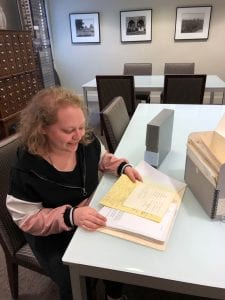An important part of the function of memory is to collectively share the past with one another. History does not live within the pages of books, but in the stories we tell to one another. None of these stories may necessarily be “true,” but all are approximations of our understandings of people and events. When we come together to share this history we are in fact creating history and creating collective memory.
As I have worked in the archives for the past few weeks, I’ve thought about how we remember and create the most intimate of histories. Eulogies encapsulate the memories of our loved ones in a time of deep mourning for their loss. We look to spiritual leaders for support, such as Rabbi Jack Segal who was the Rabbi at Beth Yeshurun for 23 years and delivered hundreds of eulogies during his time serving there. I have spent hours trying to decipher the handwriting of scrawled notes about Beth Yeshurun parishioners, sometimes scratched out and started anew as Rabbi Segal has gone back and made edits.
It is clear to me that Rabbi Segal carefully considered his role as both the preserver of memory for those who had recently passed as well as the comforter to the remaining family members. He pencils in family members who are maybe not quite officially family members, writing down that they are a sister’s fiance or a close friend to the deceased. He also carefully weaves in Psalms, those which both lament in the ancient composer’s tragedies as well as comfort us in the present day. He talks of great men and women of the Bible, whose lives he likens to those who have passed. He also shares the accomplishments of each individual’s life, their career, family, and the impact they made on the Houston community.
In a way, Rabbi Segal was also performing the work of an archivist. He had incomplete information, snapshots from a person’s life, or a letter or call from a family member if he was very lucky, and with that he constructed a narrative history. As historians, we do the same. We are left with whatever writing people have kept and given to us, pictures from important life events, and, if we are very lucky, a short interview to talk to someone about their life. Neither a eulogy nor an archive can tell the whole “truth” about history, but they both do the important work of piecing together our collective memory and, hopefully, teaching us something about ourselves in the present.


